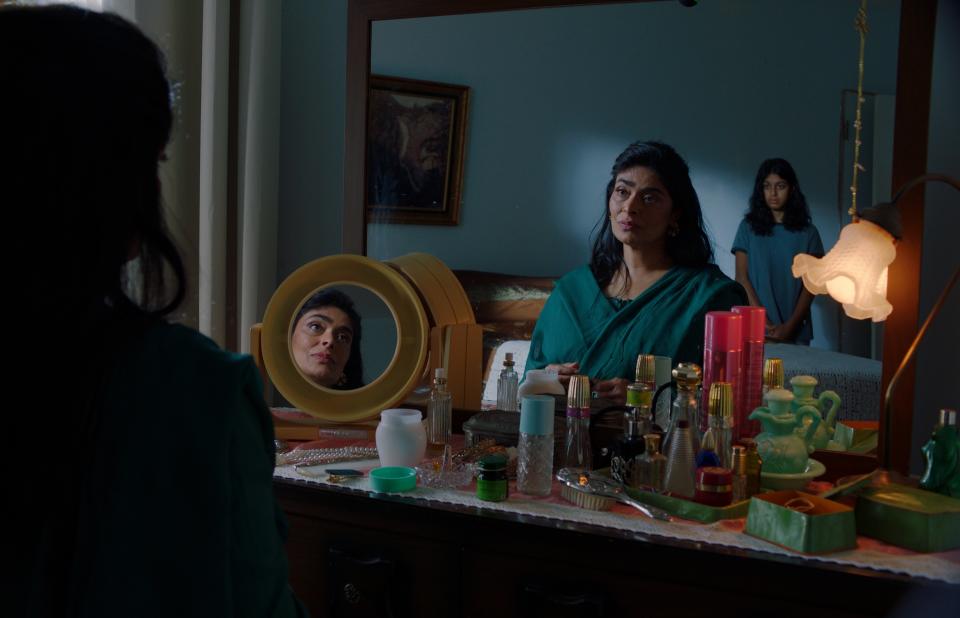‘The Queen of My Dreams’ Review: A Sweet but Scattered Mother-Daughter Story Filled with Bollywood Homage

- Oops!Something went wrong.Please try again later.
- Oops!Something went wrong.Please try again later.
- Oops!Something went wrong.Please try again later.
- Oops!Something went wrong.Please try again later.
- Oops!Something went wrong.Please try again later.
“The Queen of My Dreams” has been on its way to the big screen for more than ten years. Though not originally planned as a feature, writer and director Fawzia Mirza originally saw the story through life as both a short film and a stage play, based on her own experiences as a queer Pakistani-Canadian woman. The title is a literal translation of “Meri Sapno Ki Rani,” the wildly popular Hindi song from 1969’s “Aradhana.”
The film opens with narration from Azra (Amrit Kaur), Mirza’s self-insert, who has a complicated relationship with mother Mariam (Nimra Bucha) — but the two share an uncomplicated, undying love for the movie “Aradhana” starring Sharmila Tagore and Rajesh Khanna. When Azra’s father Hassan (Hamza Haq) suffers a fatal heart attack, Azra must join the family in Pakistan to mourn his passing — and salvage a rocky relationship with the only parent she has left.
More from IndieWire
Azra and the film are quick to sanctify Hassan, immortalized as a warm, patient, supportive figure (much like the late father in Netflix’s “Never Have I Ever,” played by Sendhil Ramamurthy). “The Queen of my Dreams” only makes room for one complicated parent-child relationship, but the Pakistani-Canadian Haq makes a standout impression that should lead to a long list of offers for future roles.
Once Azra reaches Pakistan, the film suddenly cuts to the Karachi of the 1960s, a booming, progressive utopia that Mirza — and multiple people in the audience at SXSW, where the film premiered — knew only from stories, but which comes alive in technicolor.
Here, Kaur plays the young Mariam (a nod to Khanna’s double role in “Aradhana” — and a whole lot of double roles in a whole lot of other Indian films) as she charts her own resistance to a overprotective mother, by way of Hassan. Their courtship is mesmerizing but the flashbacks somewhat disorienting, drawing clear parallels to Azra’s present but their contents never relayed to her by Mariam or anyone else. A linear version of “The Queen of My Dreams” might make more narrative sense (but also might be compared unfairly to “The Namesake”).

Kaur — who learned Urdu for the role and speaks it so well that her heavily accented English is what stands out most in the Karachi flashbacks — is electric, more suited to Azra’s livewire rebellion than Mariam’s sophisticated sensuality, but playing both with total commitment and apparent ease. She pairs fantastically with Haq in scenes of flirtation that are sexier than most Hollywood fare without so much as a kiss. Bucha is as glorious as ever and deserves every inch of the career high since “Ms. Marvel” through “Polite Society” and now here. The mother-daughter duo shine together, but the flashbacks stop them from sharing more scenes together (though credit must be paid to Ayana Manji as a truly delightful awkward tween Azra).
Apart from being a literal translation of “Meri Sapno Ki Rani,” the title “The Queen of My Dreams” hints at the danger of misunderstanding a loved one; a mother, a lover, or anyone else is easily put on a pedestal but not easily viewed as a complex, multidimensional being who shares the same struggles you do. It’s also about self-actualization as both Mariam and Azra experience it (another layer could refer to Azra’s girlfriend Rachel, played by Kya Mosey, who is all but forgotten once the setting shifts).
Still, there are one too many homages to “Meri Sapno Ki Rani,” joyful and silly though they are (I sang along every time) to the point that it threatens to hold the film back from its full potential. It’s Mirza’s personal connection to the story that makes it charming, moving, and magnetic in its best moments. To that end, the film accurately reflects the tumult of mothers and daughters and intergenerational culture gaps, which are never nearly manifested or bridge. Reality is messy — anything else is the stuff of dreams.
Grade: B-
“The Queen of My Dreams” premiered at the 2024 SXSW Film & TV Festival. It is currently seeking distribution.
Best of IndieWire
Sign up for Indiewire's Newsletter. For the latest news, follow us on Facebook, Twitter, and Instagram.

